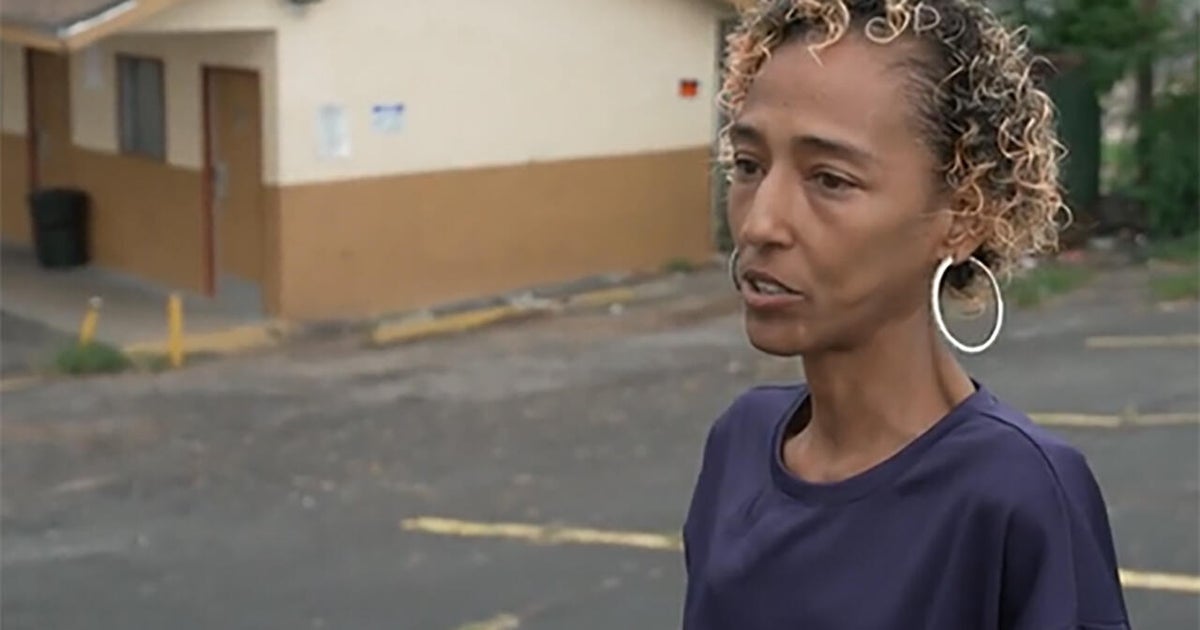

No response returned

In Atlanta, journalist Brian Goldstone introduces us to the intersection of Memorial Drive and Candler Road – the threshold of two neighborhoods. On one side: a liberal arts college and cafés. "And you cross over, and it's dialysis centers, it's liquor stores, it's payday lenders," he said. "Other areas of Atlanta are booming, but this area sort of stayed stuck in this period of decline. … The poor are out here on these peripheral areas."
Goldstone has devoted his book, to describing the challenges faced by literally millions of the working poor looking for a place to live. He has spent the better part of six years trying to understand why so many people who work full-time jobs with low wages are homeless.
"The story we as a nation have told ourselves, that hard work is the key to success, that work is an exit from poverty, not having a home, being homeless – what these people show us is that there's something profoundly not true about that story anymore," he said.
In the course of his reporting, Goldstone met Celeste (he changed her name for her privacy). Celeste has been known to work two and three jobs at a time to support her eight children. (All but one are now adults.) She's inspected boxes at a warehouse, worked at a fast-food restaurant, even sold plates of food from her room. She's resourceful. "I was working in a corner store from the time I was ten years old," she said. "It always gave me, like, a sense of pride to do a good job at whatever I'm doing."
If she doesn't have a car, she'll walk to work. Sometimes that boils down to cleaning and tidying up a convenience shop.
Just surviving is a constant struggle. For one month, she slept in her car with the kids.
What Celeste does not have is a passing credit score. "I could have the most money, but if my credit score isn't a 700, then you don't want me in your property," she said.
What totally destroyed her credit score was when an ex-boyfriend set fire to the home that she and her children were renting. "Walking into that house was like walking into a black hole," Celeste said. "We had nothing."
Goldstone said, "What pushed her and her children into homelessness was the fact that this home was owned by a private equity firm who demanded that she pay rent for the current month's rent and an additional month as well, and she wouldn't get her security deposit back. This was to break the lease on this home that had burned down."
The sheriff put an eviction notice in the mailbox of the uninhabitable house. By the time Celeste found the notice, the judge had handed down a default judgment. "And by that point her credit score had been destroyed," Goldstone said.
Which is what brought Celeste – what brings so many desperate people – to what's called an "extended-stay hotel." Celeste lived there with two of her youngest children for about three months. To stay there, she had to pay $520 a week, about $75 a day. "And that's only if you book online now," she said. "If you don't book online and you have to pay them cash at the window, then you're paying the $80 a day."
Over the years, Celeste has lived in about half a dozen extended-stays. "That's how they advertise it, too," Celeste said. "It actually says, 'Come for a night, stay for a while.'"
But the slogan, she says, is a trap: "A lot of these places are substandard. One of the places where I stayed, there was, you know you put the mats down in the bathtub to cover supposedly slipping or falling or anything? Well, I pulled my mat up and there was a big hole in the tub. A lot of places have mold or mildew; they cause health problems. If you don't have them already, you will develop them."
Celeste was still living in an extended-stay when things went from bad to a whole lot worse. She found out she had breast and ovarian cancer.
I asked, "Why didn't you go to the doctor?"
"Life was lifing," she replied. "People who are the primary breadwinners in a low-income family, you can't take the time off to go to the doctor. Because me missing a ten-hour shift at work, that's the difference of me paying for my room that day. So, of course, I want to keep a roof over my head. So, sick and all, I'm still going to go to work."
"What struck me over and over again is just how incredibly resilient you were, even after the cancer," I said. "How? Why?"
"Because that's the face you have to show the world," Celeste said. "There were many nights that I just was on my hands and knees, praying and believing that God made me a promise, and I was going to do my part, because I knew He was going to do His."
Many of these stories are variations on a similar theme, and disproportionately, they seem to impact people of color.
Rhea, for example, has four children. In the last two years, she has lived with her kids in friends' apartments, in her car and, most recently, in extended-stay hotel rooms.
The room she shares with her children has no closets, and a single small bathroom. Three of the kids sleep in bed with her; the oldest sleeps on an air mattress. "I try to get one of them to sleep with him, but they don't want to. They all want to be piled in the bed with mama," she laughed.
Rhea has been on her own with the kids since she left a domestic violence situation with the father of her children. Rhea says he never abused the kids, but "he put his hands on me a couple of times," she said.
Rhea eventually got a temporary protective order. No more abuse, but also no more child support. "He's not allowed to be around me or the kids for two years," she said. "So, I can't talk to him, his family, no one. So, everything is basically on me."
Rhea's 20-year-old son helps where he can working some overnight shifts at Amazon, but she also has a seven-year-old son with major medical issues. "He was born with congestive heart failure and he has severe asthma," she said. "I've been in and out of hospital with him three or four times a month. I'm in and out of ICU with him."
And that makes it all but impossible to keep a full-time job. Rhea struggles to pay $375 a week just for that extended-stay room working a patchwork of part-time jobs, including driving for Uber.
Goldstone said, "I think what was so shocking is that this kind of living situation is not cheaper than an apartment. It is often double, or even triple, what an apartment down the street would cost."
What explains that? "When people are desperate, and those who own these properties know that they are people who are desperate, they will take advantage of that desperation," Goldstone said.
Extended-stay hotels are often the last resort for low-income families with poor credit who have become homeless – and, Goldstone said, homelessness has become big business. "These hotels, they don't look like much, but there is a lot of money being made off of them," he said.
It's happening in a lot of our cities, but especially here in Atlanta: Urban renewal, the renovation and improvement of mostly low-income neighborhoods, restoration, gentrification – it's all good, unless you're one of the families being squeezed out.
"It's the same Wall Street investors who are leading families and individuals to become homeless to begin with, because they buy up the rental housing and then, if you're even one day late on your rent, you have an eviction automatically filed against you," Goldstone said. "Before you know it, you're out, and you don't have a home anymore."
These days, things are much better for Maurice and Natalia (not their real names). They have an apartment; life is manageable. But only five years ago, they were on the brink of disaster.
Maurice worked for a rental car agency, and Natalia for an insurance company. But when Natalia gave birth to their third child, her salary stopped.
"That threw everything off," Natalia said. "I didn't get income for, like, a point in time. And then next thing you know, you're out in the street with a baby."
Because? "We were late," she said. "I remember I begged her. She was like, 'Do you have it now? Can you get it now?' And all we needed was to get to Payday. It was crazy because, like, my mindset was, like, it was raining. The sheriff let me sit in his car."
"That still gives me anxiety," Maurice said. "Just getting the call from work, and having to leave work in a hurry, and you come home and you see that, kind of does something to you as a man. … It transforms you. It breaks you. And it will continue to break you if you'll allow it."
Natalia said, "When we get to storage, there's another family there, too, and it's like, we don't say anything to each other, but we know that look, and all you know is, just nod. It's gonna be okay. Put your stuff in there, let's try to figure out somewhere to go."
"When you see a family at a bus stop with, you know, luggage, you know they're not going to the airport," Maurice said.
Natalia said what haunts her most is the black trash bags: "When you get evicted, all your stuff … well, it was black, but now it's clear bags."
I asked, "When did you first realize that you really were homeless?"
"I was, like, filling out that paperwork and you would hesitate," Natalia said. "They'll ask you where you are living specifically – are you renting? Are you a homeowner? Or are you homeless? You sit there and you struggle for a minute. You're like, 'Well, I have a roof over my head, but it's not mine, and it's temporary, and I could actually literally be booted out tomorrow.' So, you check the box homeless. That's what we are."
It was 2020, during the pandemic, and the family of five was living in an extended-stay hotel room. Natalia was working remotely answering customer service calls. "I got flagged because of the noise," she said. "And they were asking me if I could go to a quieter spot. So, I sent them a picture of where I'm at, because I'm telling them I'm in a hotel, and they were like, 'Oh, we travel to hotels all the time. You could just go over to this …' 'Ma'am, my bed is right here! The kitchen is right here! And that's where I'm working from. Please help me find this quiet space. I'm trying my best, you know?"
Maurice said, "I remember just realizing this is like an expensive prison. I was just looking at the bill. My kids can't go outside, there's no playground. We've got to keep the curtain closed because people walk through the hotel, they're going to look into your room, so there is no privacy."
In eight months, they spent $17,000 on the extended-stay room, nearly twice as much as they had paid on their old apartment.
Goldstone said, "I think it's really important that we not talk about all of these families and individuals as if they're falling into homelessness; they are being pushed. This is an engineered neglect, and at every turn there are entire business models that are set up to capitalize on their predicament."
Asked if she was embarrassed about what happened, Natalia replied, "If I could be honest, yes, 'cause remember, it's not supposed to happen to people like us. We do everything that we were supposed to be doing. We tried our best. But you know, you still end up in a hole, in a hell hole."
"Why isn't it supposed to happen to people like you?" I asked. "You're educated?"
"Yes," she said.
"You're hard working?"
"Yes. And we tried our best. You follow all the rules of life."
As does Rhea, the single mother of four who pays $375 a week for that small extended-stay room.
A car is her livelihood right now, but she no longer has one of her own. The car she's renting costs her $60 a day; she'll have to drive for Uber two or three hours after work just to pay the car off.
The car already has 187,000 miles on it, and the tires, she says, are "horrible."
I asked, "When you lie awake at night, what are you thinking about?"
"Sometimes I want to give up," Rhea said.
"I can understand that. But you've got children, so you can't, right?"
"Yeah, my kids keep me going," she said. "It's so hard right now, I don't even know."
Sometimes when things are at their darkest, help comes in the person of someone who's known hard times herself, someone like Sherri McCoy, who has a nonprofit for the homeless called . Rhea calls Sherri "her angel."
"I wake up every day with a goal to help at least one person," said McCoy. "We are a mutual aid organization, so I reach out to our generous community, and oftentimes people donate. Sometimes they don't, and that's when we dip into the reserves of good old credit cards, my own personal ones."
To keep her family going – between the room, the car, and other expenses – Rhea has to make $1,200 a week. "I'm constantly driving from 2:00 in the morning, and sometimes I won't sit down 'til 8:00 at night," she said.
I asked, "Could you work any harder?"
"If I could, I would," Rhea smiled.
READ AN EXCERPT:
For his new book, the journalist examines why so many people who work full-time jobs with low wages are homeless in America.
For more info:
Story produced by Deirdre Cohen. Editor: Ed Givnish.
See also:





